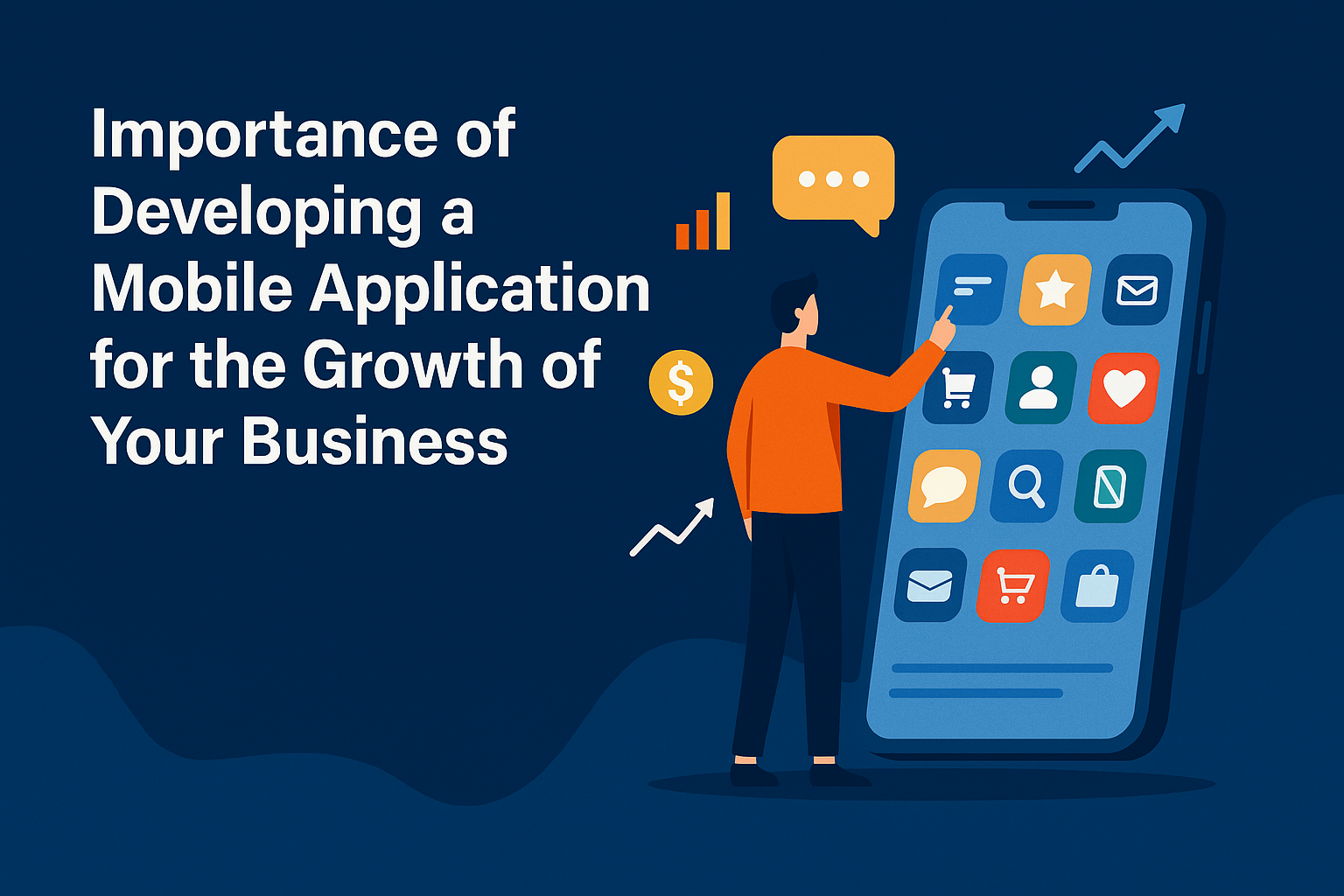
🚀 Introduction
Have you noticed how often you reach for your phone in a day? Whether you’re ordering food, checking your bank balance, or browsing for your next purchase—chances are, you’re doing it through a mobile app. That’s not just a trend—it’s the new normal.
In a world that’s moving faster than ever, mobile apps have emerged as game-changers for businesses. From startups to enterprises, everyone is jumping on the mobile bandwagon—and for good reason.
Why Mobile Apps Matter More Than Ever
We’re living in an app-first world. With over 7.4 billion smartphone users expected by 2025 (Statista), the mobile app industry is booming. If your business doesn’t have an app yet, you’re probably leaving money—and customers—on the table.
A Quick Look at Mobile Usage Statistics
- Users spend 88% of their mobile time on apps (eMarketer)
- 79% of smartphone users have made a purchase using their mobile device
- Businesses with mobile apps see up to 2x more retention compared to those without
Now that we’ve set the stage, let’s dive into why mobile apps are crucial for business growth.
📱 The Digital Shift in Consumer Behavior
The Rise of Mobile-First Consumers
Today’s consumers are glued to their smartphones. They don’t want to visit a website, type a URL, or wait for pages to load. They want instant access—and mobile apps give it to them.
How Mobile Convenience Builds Loyalty
Convenience is king. A smooth, intuitive app experience can keep users coming back. Whether it’s easy browsing, one-click checkout, or fast customer support, mobile apps create habits—and habits drive loyalty.
💼 Key Benefits of Mobile Apps for Business Growth
Direct Communication with Customers
Apps open up a direct communication channel via push notifications, in-app messaging, and chatbots. You can engage with users in real-time, promote offers, or share updates instantly.
Enhanced Brand Visibility
Every time a user unlocks their phone, your app icon is right there. It’s like free, daily brand exposure—subtle, yet powerful.
Improved Customer Engagement
Mobile apps are interactive by nature. Features like gamification, loyalty rewards, or exclusive content keep users engaged and interested.
Increased Revenue Potential
In-app purchases, subscription models, and mobile commerce (mCommerce) are driving billions in revenue. With the right monetization strategy, your app can become a major profit center.
Better Customer Insights and Analytics
Apps allow you to track user behavior, preferences, and usage patterns. These insights help you tailor your offerings and boost ROI.
🏢 Industry-Specific Advantages of Mobile Apps
E-Commerce and Retail
Apps drive more conversions than mobile websites—3x higher, in fact. Think faster checkouts, personalized recommendations, and push sale alerts.
Hospitality and Travel
Booking hotels, managing itineraries, and accessing travel guides—all in one app. It’s a seamless experience that builds trust.
Healthcare and Fitness
From telemedicine to workout tracking, apps provide 24/7 value. They also improve patient retention and engagement.
Finance and Banking
Mobile banking apps have become essential. They offer convenience, security, and customer retention through features like instant transfers and budgeting tools.
✨ Essential Features of a Business Mobile App
User-Friendly Design and Navigation
Keep it simple. A cluttered interface frustrates users. Clean UI = Happy users = Better retention.
Push Notifications
Remind users of new offers, abandoned carts, or upcoming events. But don’t overdo it—nobody likes spam.
In-App Purchases and Payment Integrations
The easier it is to pay, the more likely customers are to buy. Offer multiple secure payment options.
Customer Service Integrations
Live chat, AI bots, FAQ sections—make support easy to access and quick to resolve.
⚔️ The Competitive Edge Mobile Apps Provide
Standing Out in Crowded Markets
In a saturated market, having a sleek mobile app gives you a modern edge. It’s a mark of professionalism and forward-thinking.
Speed and Personalization as Differentiators
Apps are faster than websites and can offer highly personalized experiences—like tailored content, product suggestions, and location-based offers.
💙 Mobile Apps and Brand Loyalty
Creating Personalized Experiences
Your app can greet users by name, recommend their favorite products, and offer birthday discounts. Personal touches = deeper connections.
Building Long-Term Customer Relationships
Loyalty programs, exclusive deals, and seamless service via apps help turn one-time buyers into lifelong fans.
📢 The Role of Mobile Apps in Marketing
Seamless Integration with Digital Marketing Strategies
Your app can integrate with your email campaigns, social media, and paid ads to create a cohesive marketing machine.
Boosting Social Sharing and Word-of-Mouth
Apps make it easier for users to share products, refer friends, and leave reviews—boosting your organic reach.
📊 Data-Driven Decisions Through App Analytics
Tracking User Behavior
Which features are popular? Where are users dropping off? These insights help improve your app and offerings.
Adapting to Trends and Needs
Use analytics to keep evolving. If a trend pops up, your app should be agile enough to ride the wave.
❌ Common Myths About Business Mobile Apps
“Only Big Brands Need Apps”
False. Small and medium businesses can benefit just as much—sometimes even more—by gaining local loyalty and niche engagement.
“Apps Are Too Expensive”
Not anymore. Low-code platforms and freelance developers have made app development accessible to most budgets.
“Websites Are Enough”
Websites are important, but apps offer speed, offline access, push notifications, and richer user experiences.
⚠️ Challenges in Developing a Mobile App (and How to Overcome Them)
Budget Concerns
Start with an MVP (Minimum Viable Product). Build essential features first, then scale gradually.
Finding the Right Development Team
Hire experienced developers or partner with reputable agencies. Don’t just go for the cheapest option.
Post-Launch Maintenance
Your work doesn’t end at launch. Regular updates, bug fixes, and new features are key to success.
🔮 Future Trends in Mobile Apps for Business
AI and Machine Learning
Smart recommendations, chatbots, predictive analytics—all powered by AI.
Augmented Reality (AR) Experiences
Try-before-you-buy features (especially in retail) are becoming more common and expected.
Voice-Enabled Interfaces
Voice search and commands are gaining ground. Think Alexa, Siri, or Google Assistant integrations.
📈 Real-World Examples of Business Growth Through Apps
Starbucks
Their mobile app made ordering coffee so convenient, it’s now responsible for 25%+ of total sales.
Nike
Nike’s app isn’t just for shopping—it’s a community hub with workouts, challenges, and personalized content.
Domino’s Pizza
Their app boosted sales with features like pizza trackers, reorders, and digital coupons—driving over 60% of their sales.
🧠 Tips for Launching a Successful Mobile App
Start with a Clear Goal
What’s your app solving? Define it early and keep that vision front and center.
Prioritize User Feedback
Listen to your users. Their feedback will help you improve, retain, and grow.
Market Your App Effectively
Use social media, email, influencers, and app store optimization (ASO) to drive downloads.
🔚 Conclusion
So, is building a mobile app worth it? Absolutely.
A well-designed mobile app can elevate your brand, grow your customer base, and drive serious revenue. It’s not just a tech accessory—it’s a strategic asset. Whether you’re a bakery down the street or a global retailer, mobile apps can unlock new levels of growth and loyalty.
If you’re serious about scaling your business in this mobile-first world, it’s time to get your app idea off the ground.
❓FAQs
1. Why should a small business consider a mobile app?
Small businesses can boost visibility, build loyalty, and compete more effectively through apps that connect directly with customers.
2. How much does it cost to develop a business app?
Costs vary, but you can start with an MVP for as little as $5,000–$10,000 using freelance or low-code solutions.
3. Can a mobile app increase sales?
Yes! Apps improve engagement, streamline purchases, and encourage repeat business—all of which drive sales.
4. What platform should I build my app on first?
Start with the platform where your audience is. For most businesses, Android and iOS are both must-haves eventually.
5. How do I know if my business needs an app?
If your customers use smartphones and you want to boost engagement, loyalty, and sales—then yes, you probably do!






